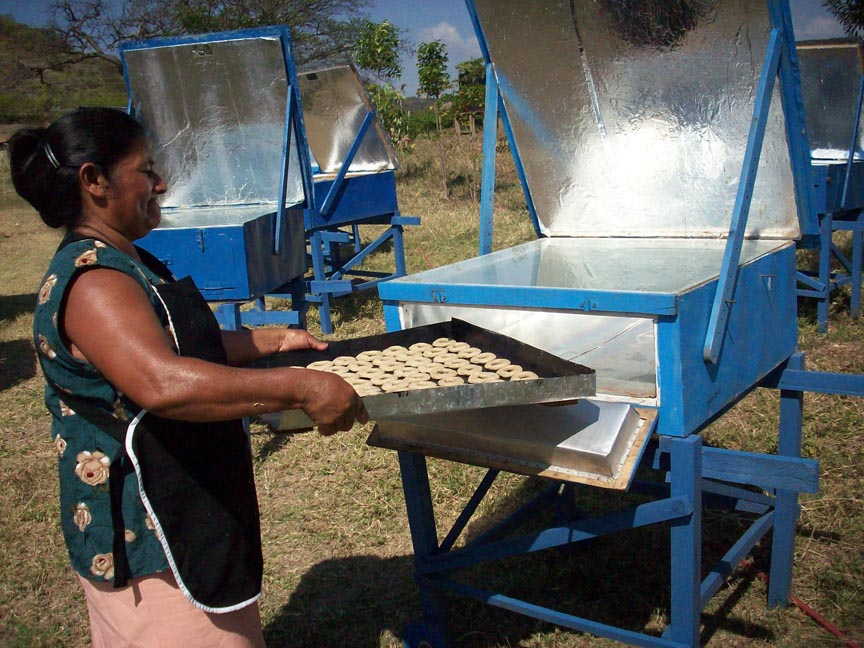|

Special “News You Send” Issue
By Rene Hamlin, SCI Resource Development Director
 |
|
A Madagascar solar cooker project reported in News You Send is not only providing local employment, but also helping to keep families safer and healthier by reducing their exposure to dangerous, smoky cooking fires (photo: ADES) |
This is a special issue of the Solar Cooker Review chock full of “News You
Send” submissions. Collecting and sharing information about solar cooker projects
from around the world is an important and unique service provided by Solar Cookers
International (SCI). We are thrilled every time we hear from someone who took
action to promote solar cookers in their own region because of connections made
through News You Send.
Though many readers tell us they are quite fond of the News You Send section,
it is often an unsung hero of SCI’s offerings. It may not be as exciting to
some donors as the sending of solar cookers and water pasteurization indicators
to Haiti’s earthquake survivors, or the training of new solar cooking trainers
in Kenya, or the assistance provided to Darfur refugees struggling to earn a
small income from making and selling solar cookers. But for those individuals
and organizations struggling to find fuel to cook or struggling to prevent their
children from getting diarrheal diseases, News You Send can provide vital information
about local technologies and programs, and ways to incorporate that knowledge
into their lives.
News You Send is simply that — the news you send about a solar cooking project
that you implemented in your community, a novel solar cooker you designed, a
technical problem you solved, etc. Many of these accomplishments are also shared
through SCI’s educational Web sites, but for those people who still live without
Internet, the Review, and News You Send in particular, may be their most valuable
solar cooking resource!
Your continued support enables us to help people all over the world, people
we only know through correspondence. This issue of the Review is dedicated to
those people who share with us their solar cooker news, discoveries, and accomplishments
in the wonderful journey that is solar cooking.
Please join me in celebrating those who take the time to write to us and
who share with us so we know that we are achieving our mission to promote solar
cooking and solar water pasteurization systems to benefit people and environments.
News you send
[Editor's note:
E-mail your news items to info@solarcookers.org
or via postal mail to Kevin Porter, Solar Cookers International, 1919 21st Street
#101, Sacramento, California 95811-6827, USA. We want to hear from you — especially
if your program is growing or if your work has not been featured in the Solar
Cooker Review before. Please include your contact information. Submissions are
subject to editing if printed.]
AFRICA
Madagascar
 |
|
ADES employs over 30 local trainers and carpenters in three communities, including carpenters hand-crafting wooden solar box cookers in Tulear (photo: ADES)
|
Since 2001, the Association pour le Développement de l’Energie Solaire (ADES)
has been making and selling solar cookers in the southwestern part of
Madagascar,
providing much-needed cooking alternatives as well as employment for over 30
local carpenters and trainers. In 2003, ADES built its first permanent solar cooker construction workshop
in Tulear. A second construction workshop was established in Ejeda in 2006,
followed in 2008 by a workshop in Morondava. Each of these regional centers
also has sales and demonstration offices. Future plans include development of
a fourth regional center in Anosy or Antandroy, and the creation of two or three
local branches within each region to reduce transportation distances and increase
outreach capacity. According to ADES, southwestern Madagascar experiences about 330 sunny days
per year and is a nearly ideal region for solar cooking. However, per capita
income in Madagascar is only about $400 per year, making it difficult for families
to afford solar cookers and spend their meager income on a technology they are
not familiar with.

|
|
Parabolic cookers and solar box cookers can work in a complementary fashion to meet a variety of cooking needs (photo: ADES)
|
Rising firewood and charcoal costs over the past few years
are making solar cookers comparatively more affordable, but still out of reach
for many. Subsidies have mostly come from donors in Switzerland and a handful
of awards. The Madagascar government has provided some additional support, partnering
with ADES to promote renewable energy in Tulear. Hand-crafted wooden solar box cookers, produced locally for upwards of $200
each, are sold at a subsidized price of just over $20. These cookers reach temperatures
of up to 150°C, and are commonly used to cook rice, various root vegetables,
meat, fish, bread, and cakes. Metal parabolic solar cookers are assembled locally
for about $160 each, from aluminum and steel parts made by another local organization
at an already subsidized price. The parabolic cookers are then sold at a subsidized
price of about $50. These cookers reach even higher temperatures, but require
stirring of food and more frequent adjustments to track the sun. They are particularly
useful for frying, and can work in a complementary fashion with solar box cookers.
Both cookers come with 7-year warranties. By the end of 2009, ADES had sold 4,640 solar cookers. It hopes to ramp up
its outreach and sales capacity with funding from carbon credit offsets.
Contact:
Regula Ochsner, CEO, ADES, Lanzenstr. 18, 8913 Ottenbach, Switzerland.
Tel: 0041 44 761 20 61, e-mail:
regulaochsner@adesolaire.org, Web:
www.adesolaire.org
Rwanda / United States
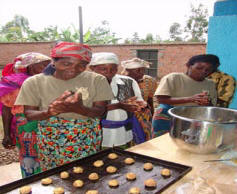 |
|
The “Bake the Cycle” project helps break the cycle of poverty by providing
solar bakery jobs to widowed women (photo: True Vineyard Ministries)
|
U.S-based
True Vineyard Ministries provides sustainable opportunities for
widows and children impacted by genocide, subsequent conflicts, and HIV/AIDS
in Rwanda. Its “Bake the Cycle” project is helping to break the cycle of poverty
by providing solar bakery jobs to 10 widowed women supporting families in Ruhengeri.
The bakery provides a variety of breads to local businesses and families. The women use a commercial-sized
Villager Sun Oven® that reaches temperatures
in excess of 250°C and can bake hundreds of loaves of bread each day. It has
a propane backup system for evening use and during inclement weather.
According to True Vineyard Ministries, the project is already having an impact.
“For the first time in the widows’ lives, they are able to consistently provide
food, clothing, shelter, and education for their families.”
Contact: True Vineyard Ministries, 317 West San
Antonio Street, San Marcos, Texas 78666, USA. Tel: 512-392-8463, e-mail:
diana.wiley@truevineyard.org,
Web: www.truevineyard.org
Sudan / United States
 |
|
A solar meal in El Yousif, Sudan (photo: DPDO) |
Stephen Harrigan runs a U.S.-based nonprofit organization called Solar Clutch
that designs and produces solar cookers for distribution to impoverished parts
of the world. His cookers include a corrugated plastic solar box cooker called
the Sun Scoop and a panel-type solar cooker made from woven baskets and modified
clay water pots common in Sudan, called the Borma. Through Solar Clutch, Harrigan also offers consultation and training services
to organizations wishing to set up solar cooker programs. In 2006, Harrigan
helped the Darfur Peace and Development Organization (DPDO) begin a solar cooker
training program for women displaced due to persistent conflict in Darfur. After
much research and experimentation, he prepared a solar cooking training model
for DPDO. Harrigan selected Solar Cookers International’s cardboard and foil
solar CooKit as the primary solar cooker to be used due to its low cost and
simplicity. Though the solar cookers are being made locally in Sudan, DPDO has
also imported several hundred more durable corrugated plastic versions made
by volunteers in the United States.
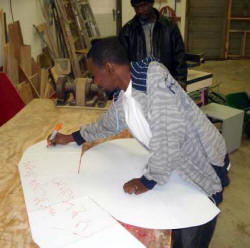 |
Volunteers in Fort Wayne, Indiana (USA) are making corrugated plastic
solar cookers for displaced families in Darfur, complete with uplifting
personal messages written on the backs (photo: Solar Clutch) |
From the beginning, Harrigan believed that DPDO’s infrastructure and ongoing
work in internally displaced persons (IDP) camps would be useful in promoting
solar cooking. Solar cookers make a lot of sense in these camps because traditional
cooking fuels, especially firewood, are in short supply, and the women that
forage outside the camps for firewood must not only walk ever greater distances
to find firewood, but also risk their personal safety. DPDO reports having trained 321 IDPs to solar cook from 2006 through mid-2009.
Workshops have taken place in a number of camps and towns, including: Kalma
and Sakali IDP camps in South Darfur, El Fasher town and Kassab IDP camp in
North Darfur, and Omdurman and Haj Yousif towns in Khartoum.
 |
|
Women spend less time and energy foraging for firewood outside of
IDP camps when they use solar CooKits (photo: DPDO) |
According to DPDO’s Web site, “workshop participants quickly recognized the
time- and money-saving benefits of the cookers, and learned to prepare all of
the traditional Sudanese foods. [They] … continue to experiment with recipes,
develop cooking-time charts, and conduct training workshops within their communities.
DPDO subsidizes training workshops and provides supplies and training expertise,
manuals, and follow-up assessment of use.” Future trainings have been scheduled for DPDO women’s centers in Kassab and
Abu-Shouk camps, the latter of which was visited by U.S. Special Envoy to Sudan
Scott Gration in September 2009. Many of the women at the center had previously
been trained and were solar cooking when Gration visited. DPDO reports that
Gration “was impressed with [the women’s] efforts and tasted rice that had been
cooked with a solar cooker.” Contact: Stephen Harrigan, Darfur Solar Cookers Project Coordinator. Tel:
+1 (260) 418-6699, e-mail: solarclutch@gmail.com, Web:
www.solarclutch.com and
www.darfurpeace.org
ASIA AND OCEANIA
China / United States
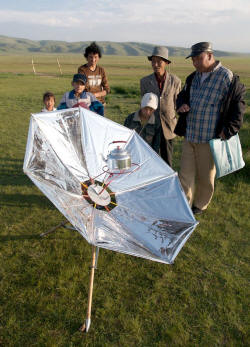 |
|
OED says its SolSource 3-in-1 meets the needs of nomadic Himalayan
communities: it’s lightweight and portable, yet powerful enough to boil water
for tea (photo: One Earth Designs) |
The rural population of the Tibetan Plateau relies heavily on biomass fuels,
especially dung and wood, for cooking and heating. These fuels cause indoor
air pollution, contribute to climate change, and perpetuate gender inequality
because girls spend long hours collecting fuel while boys attend school.
One
Earth Designs (OED), a U.S.-based nonprofit organization, has developed a novel
solar device to reduce reliance on these fuels in this region. The device, called
the SolSource 3-in-1, not only enables rural communities to harness the sun’s
energy for portable solar cooking, but for space heating and electricity generation
as well. High-temperature parabolic solar cookers are currently available and used
in Himalayan communities. However, they are often made out of mirror-lined concrete
shells that are heavy and breakable. Many nomadic villagers shared with OED
a desire for parabolic solar cookers that are portable enough to be taken into
the fields while working or tending flocks, but sturdy enough to withstand the
harsh winds of the Tibetan Plateau. OED worked with rural communities in the
Himalayan region to design the SolSource 3-in-1 according to these local needs
and with local materials when feasible. The reflective component of the SolSource 3-in-1 is a lightweight, foldable
parabolic shell comprised of several triangular yak-wool canvas panels stretched
across a curved bamboo frame and lined with aluminized polyester film (Mylar®).
This shell sits on detachable legs that can be staked to the ground to prevent
the cooker from blowing over. Multiple functions are performed by attaching
one of three interchangeable modules to the center of the shell at the focal
area. The first module cooks food and pasteurizes water. Its high focal temperature
enables traditional cooking that relies primarily on stir-frying and boiling
water for tea and tsampa. A second module collects and stores heat for later
use in the home. As journalist Julia Levitt reports on worldchanging.com, the
SolSource 3-in-1 “generates enough heat at its focal point to bring a kettle
of water to boil in about five to seven minutes. … While it is in use, the device
generates heat to warm the home.” A third module generates and stores about
20 watts of thermo-electricity per hour. The SolSource 3-in-1 has been recognized for its innovative design by the
Massachusetts Institute of Technology’s Yunus Innovation Challenge, the Clinton
Global Initiative, and the U.S. Environmental Protection Agency. Last year,
the project received the prestigious St. Andrews Prize for the Environment.
According to Catlin Powers, chief operating officer of OED, the $75,000 St.
Andrews prize money “will support the first large-scale field test and production
trial, involving 20 Chinese communities.”
Contact: One Earth Designs, P.O. Box 382559,
Cambridge, Massachusetts 02238, USA. Tel: +1-617-671-0727, e-mail:
info@oneearthdesigns.org, Web:
www.oneearthdesigns.org
Fiji / Kiribati / Tuvalu
 |
|
Workshop participants in Kiribati cook rice in a solar box cooker (photo: Ferris University) |
In 2007, the Pacific Islands Applied Geoscience Commission (SOPAC) began
a series of solar cooking demonstrations in Kiribati, Tuvalu, and Fiji. Since
2008, SOPAC has partnered with Japan’s Ferris University to promote the use
of solar cookers in Kiribati and Tuvalu. Throughout the summer of 2008, a small pilot project was conducted in Kiribati
using a parabolic solar cooker from Japan and hand-made solar box cookers designed
by Ferris University. Four women’s groups were given solar cooking training
by the Kiribati Ministry of Public Works and Utilities, and the group’s members
were then allowed to use the cookers over a period of several weeks to test
the cookers’ usefulness for local foods and to record reductions in traditional
cooking fuel use, particularly that of kerosene. The women cooked a variety
of traditional foods, including rice, fish, octopus, pawpaw, breadfruit, meat
soups, and potatoes. They also used the parabolic solar cooker to prepare tea.
The kerosene savings realized during the project was approximately one-third
liter, or about $0.40 worth, per good solar cooking day. A similar project was
conducted in Tuvalu in the fall of 2008. SOPAC continues to promote solar cooking in Kiribati, Tuvalu, and Fiji. It
strives to: increase the use of solar cookers to help meet regional renewable
energy targets; promote partnerships between the local community organizations
and public sectors; mobilize external financing to develop solar cooking initiatives;
and establish micro-credit financing for the purchase of solar cookers. A number of solar cooker construction and use workshops have taken place
during and after the pilot project. A parabolic solar cooker workshop is scheduled
for spring 2010 in Fiji. In conjunction with Ferris University, SOPAC has produced a solar cooker
construction manual detailing the materials and steps required to build the
solar box cookers used in its projects. The manual is available for download
from the SOPAC Web site. Specified materials include plywood, timber, glass,
and one of several insulation options.
Contact: Koin Etuati, Project Officer, Energy
Section, SOPAC Secretariat, Private Bag, GPO, Suva, Fiji. Tel: (679)
3381377, fax: (679) 3370040, e-mail:
koin@sopac.org, Web: www.sopac.org
India
 |
|
University students served almost 1,000 solar snacks at the Dhule,
Maharashtra Energy Day (photo: Ajay Chandak) |
Professor Ajay Chandak, of Promoters and Researchers in Non-Conventional
Energy (PRINCE), reports that his organization ran a “solar canteen” at the
March 2009 Energy Day celebration in Dhule, Maharashtra. With help from nearly
100 mechanical engineering students from SSVPS BSD College of Engineering, almost
1,000 solar snacks — such as khichadi, idlis, cakes, and coffee — were served
to attendees. A variety of curved concentrator-type solar cookers were used
to prepare the snacks, including a number of SK-14 parabolic solar c
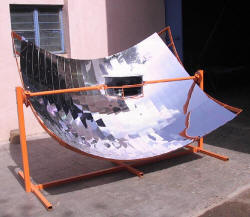 |
|
Aadhunik Global Energy sells PRINCE’s “square” concentrator cooker
as well as this larger “community” version with reflectors of 2 meters x 1.5
meters (photo: Aadhunik Global Energy) |
ookers,
a large 2.3-meter diameter “community” parabolic solar cooker, and a PRINCE-designed
“square” concentrator solar cooker. The latter, available in small or large
quantities from Aadhunik Global Energy, reflects sunlight onto a cooking pot
with a series of anodized aluminum strips attached to curved metal bars within
a square outer frame 1.2 meters x 1.2 meters.
“Many students, staff, and visitors showed great interest in the solar cooking
demonstrations,” said Chandak. “[A] local manufacturer … reported selling around
10 solar cookers in the next two days, which is a welcome outcome of such event.”
Contact: Professor Ajay Chandak, Promoters and Researchers in Non-Conventional
Energy (PRINCE), Suman Foundation, Shamgiri, Agra Road, Deopur, Dhule - 424005,
India. Tel: +91-2562-271995 (office) or +91-9823033344 (mobile), e-mail:
ajay@princeindia.org,
Web: www.princeindia.org; V.K. Desai, Aadhunik Global Energy, c/o TinyTech Plants,
Tagore Road, Rajkot - 360002, India. Tel: 91 281 248 0166 (office) or 91 92
27 60 65 70 (mobile), fax: 91 281 246 7552, e-mail:
energy@tinytechindia.com,
Web: www.tinytechindia.com
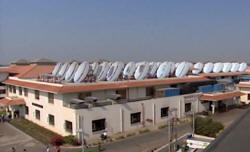 |
|
Dozens of reflective dishes on the roof of Shirdi Saibaba temple
generate enough steam to cook tens of thousands of meals daily (photo: CNN) |
Gadhia Solar Energy Systems Pvt. Ltd. recently completed installation of
an enormous solar steam cooking system, capable of cooking 40,000-50,000 meals
per day. It is located at Shirdi Saibaba temple in Shirdi, Maharashtra, India.
With nearly 30,000 visitors each day, the temple’s dining halls are some of
the largest in India.
The solar steam cooking system is comprised of 73 rooftop-mounted reflective
dishes of 16 square meters each. The dishes concentrate sunlight on receivers
that contain water, generating steam that is piped down to the kitchen for cooking
p
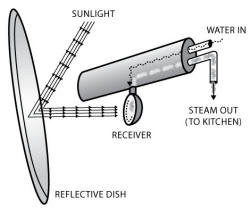 |
|
Temperatures of nearly 500°C are achieved at the receivers, where
water is continuously converted to steam that is piped down to the kitchen (graphic:
Kevin Porter) |
urposes. To maintain constant focus with the sun, the dishes automatically
rotate throughout the day after being manually aligned once each morning. The
solar steam cooking system is retrofitted to existing liquid petroleum gas-powered
steam boilers that are still used in the evening and during prolonged periods
of inclement weather.
Though the solar steam cooking system cost nearly $300,000, government subsidies
reduced the temple’s portion to about $170,000. Liquid petroleum gas use has
been cut by roughly 100,000 kilograms each year, for an annual savings of approximately
$45,000. The temple should recoup its investment in three to four years.
According to company founder Deepak Gadhia, the solar steam cooking technology
was originally developed in Germany. However, the equipment does not contain
imported com
 |
|
Temple chefs must use huge cooking vessels to meet the daily demand
for food (photo: CNN)/td>
|
ponents and is manufactured with local machinery and labor, creating
much-needed jobs. Gadhia has adapted the system for use in India, and has installed
50 such systems of varying sizes over the past two decades.
The March edition of CNN’s Eco Solutions program highlights the Shirdi Saibaba
temple solar steam cooking system. The video is available on-line:
http://edition.cnn.com/video/#/video/tech/2010/02/21/kapur.india.green.temp.cnn?iref=allsearch
Contact: Badal Shah, Managing Director, Gadhia Solar Energy Systems Pvt.
Ltd., 86, Old G.I.D.C, Gundlav, Valsad 396035, Gujarat, India. Tel:
+91-9820-700189, fax: +91-2632-236703, e-mail:
badal@gadhia-solar.com, Web:
www.gadhia-solar.com
LATIN AMERICA AND IBERIA
Dominican Republic / Haiti
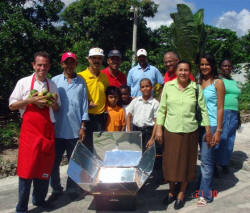 |
|
Kevin Adair (left) hopes to distribute an additional 300
Global Sun Ovens in the Dominican Republic and Haiti by mid-2010 (photo:
Kevin Adair) |
While shuttling between jobs at a number of resorts in the Dominican Republic,
entertainer Kevin Adair witnessed the daily struggles many women go through
to collect cooking fuel and the health problems incurred by them and their children
due to continuously breathing in smoke from cooking fires. Adair also sensed
that the resort vacationers he was entertaining were not being offered opportunities
to really experience the people, culture, history, and food of the Dominican
Republic. Adair began to address these issues in 2005 when he purchased 40 acres
of lush land near Higuey, Altagracia, and formed El Fuego del Sol — a “GeoTourism
EcoVillage” that offers alternative travel experiences for individuals and groups
looking to delve a bit deeper into the geographical character of the area and
its people in an ecologically sustainable way. Partnering with Sun Ovens International, Adair opened Force of the Sun, a
Global Sun Oven® manufacturing facility that serves the Dominican Republic and
Haiti while providing local jobs that meet fair-trade standards. Visitors to
El Fuego del Sol are served traditional meals cooked using a non-traditional
fuel source — the sun. They not only taste how wonderful solar-cooked food can
be, but also learn about the many health, economic, and environmental benefits
of solar cooker use in the region. A requirement of staying at the center is
the purchase of a Sun Oven that will be made available to a development organization
or a local family in need. In 2007, to expand the reach of this solar cooker distribution program, Force
of the Sun began working with
Grupo Jaragua, a Dominican nonprofit organization
that operates a number of community centers. They developed and continue to
use a solar cooker training and purchasing system that involves subsidies and/or
volunteer credits. Before a family can purchase or earn a solar cooker, they must learn to use
it and cook several meals at the community center. According to Adair, potential
solar cooker recipient families must “first cook with the Sun Ovens, preparing
food for other volunteers, and do additional community service. … This keeps
the Sun Oven from being taken for granted, and familiarizes the recipient with
solar cooking techniques well in advance of their receiving a Sun Oven.” Next, a reasonable price is set for the subsidized solar cookers. Families
are given the opportunity to lower that initial price by keeping a month-long
log of wood and propane cooking fuel purchases. A payment plan is then established,
wherein the families receive their solar cookers, and pay a weekly amount that
is less than the amount of money saved in cooking fuel costs. If the family
continues to log fuel purchases, along with solar cooker use, they can submit
the journals for additional credits towards the purchase price based on the
number of months tracked. The purchase price is further reduced or even waived by volunteering at the
community center through activities like reading to children or planting trees.
All family members can volunteer, but the men are especially encouraged to participate
because they have been shown in this project to be the most hesitant. By requiring
that community center meals be cooked with Sun Ovens whenever possible, families
that volunteer become accustomed to the food and the solar cooking process.
Volunteering to cook at the community center is a great way for families to
become familiar with the technology and earn a Sun Oven. Using this distribution model, Adair hopes to provide an additional 300 Sun
Ovens by mid-2010. Contact: Kevin Adair, Force of the Sun, c/o Adair Performance CxA, Higuey
Zona Franca #7, Higuey, Dominican Republic. E-mail:
kevadair@aol.com, Web:
www.forceofthesun.com
Guyana
 |
|
A pot of solar “cook-up” ready for the judges (photo: Guyana Government Information Agency) |
Solar Cookers International (SCI) board member
Patricia McArdle was invited
by the U.S. Southern Command (SOUTHCOM) to participate in the 2009 Crisis Management
IV experiment in Georgetown, Guyana. This annual series of experiments explores
new technologies that are beneficial and easily transferable to partner nations
in Latin America. The focus of this year’s experiment was flood management. Though susceptible to flooding every few years, Guyana has abundant sunshine
for solar cooking, even during the rainy season. As part of the SOUTHCOM program,
McArdle gave a solar cooking presentation to officials of the Guyana Civil Defense
Commission. She left a number of solar cooking kits with the officials for use
in future demonstrations. McArdle also organized and supervised an integrated solar cooking competition
between two teams of students from the University of Guyana’s School of Earth
and Environmental Sciences. The purpose of the competition was to demonstrate
the capability of the solar CooKit — SCI’s simple cardboard solar cooker — to
cook traditional local dishes using only sunlight. The students were split into
teams, and cooked two versions of “cook-up,” one with black-eyed peas and one
with split peas. They were also required to pasteurize drinking water using
the CooKits, and confirm pasteurization temperatures using a Water Pasteurization
Indicator (WAPI). The meals were tasted and judged by a number of local officials. The winners
received CooKits and pots. The students immediately began planning for future
demonstrations, including one at a regional Scout Jamboree. A front-page article in the Stabroek News had this to say about the solar
cooking competition: “While some persons were hesitant to sample the two [cook-up]
varieties, it was unanimously agreed that the popular dish turned out to be
quite tasty.” McArdle organized a similar program for the 2008 Crisis Management III experiment
in Tegucigalpa, Honduras. Contact: Patricia McArdle - e-mail:
solarwind1@mac.com
Mexico
 |
|
TTom Carter’s modified solar CooKit (right) has fewer curves and is made by joining multiple cardboard panels together (photo: Tom Carter) |
While travelling in Mexico late last year, Tom Carter taught a class
on solar cooking and water pasteurization for local nongovernmental
organizations (NGOs). The nearly 40 students in attendance learned
how to conduct and read simple water tests, and how to make
biologically contaminated drinking water safe by heating it in a
solar cooker to pasteurization temperatures as indicated by a
Water
Pasteurization Indicator (WAPI). The class built about 15 simple solar cookers based on
Solar Cookers International’s CooKit. Carter modified the design
by removing most of the curves and by joining multiple cardboard
panels together instead of using one solid piece. The product is
somewhat easier to build and reduces the amount of cardboard
needed. “This pattern … is easier to make,” says Carter. “It
requires three boxes of approximately the same size or perhaps
only two if they have nice tops or bottoms.” The solar cookers
and a number of water testing kits and WAPIs were left with the
NGO representatives. Contact: Tom Carter - e-mail:
cartport@comcast.net
Nicaragua
 |
|
Many of the Solar Women use their solar box cookers to produce baked
goods for sale (photo: Grupo Fenix) |
Grupo Fenix was founded in 1995 by a group of engineering students and professor
Susan Kinne at the National Engineering University (Universidad Nacional de
Ingeniería) in Managua, Nicaragua. The mission of Grupo Fenix is to contribute
to the wellbeing of rural communities, creating an awareness of sustainable
lifestyles through technical and cultural exchange, promotion, and research
in the field of renewable energy. A 1999 Grupo Fenix project to reintegrate landmine victims into society through
renewable energy technology jobs gave birth to the Solar Women of Totogalpa
— a group of nearly two dozen women, mostly single mothers with little time
or money, that recognized the potential benefits solar cookers and solar food
dryers could bring to themselves and their community. The Solar Women have been learning about and teaching solar cooking and drying
for several years. A 2008 survey of 18 Solar Women, predominantly living in
Sabana Grande, revealed that they use their solar cookers daily or almost daily,
usually in conjunction with a more traditional wood or gas stove. They frequently
use solar cookers to roast coffee, as well as to cook meat, rice, eggs, beans,
and bananas. Twelve of the surveyed women say they are now able to bake and
roast foods that they could not do easily over fire, while 11 of them use the
solar cookers to produce items for sale, such as baked goods, candies, and roast
coffee. According to Grupo Fenix volunteer Charlotte Ross, the Solar Women are committed
to working together to create job opportunities for themselves and future generations.
“Women that have been generally shy and passive for generations are now taking
a vested interest in bettering their community and environment, making and voting
on decisions about their future, listening to themselves and one another, and
feeling proud about what they have to say.” The Solar Women not only teach others to make solar cookers from simple materials
like scrap cardboard and aluminum foil, but also manufacture and sell solar
box cookers made from durable materials like metal and wood. These cookers are
fairly large, and accommodate multiple cooking pots. Through service-learning
partnerships with university groups like Engineers in Technical Humanitarian
Opportunities of Service-learning (ETHOS) and Engineers for a Sustainable World,
the Solar Women have been able to improve upon their solar cooker designs while
giving real-world development experience to students.
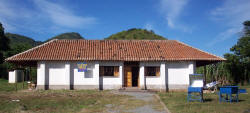 |
|
The planned sustainable community in Sabana Grande recently passed its first milestone with the construction of a solar center (photo: Grupo Fenix) |
Grupo Fenix and the Solar Women hope to create a model sustainable community
in Sabana Grande that creates jobs and is replicable. Recently, the Solar Women
took a huge step forward by planning and constructing a solar center on three
acres of land situated on the main highway to Honduras. They hand made the nearly
6,000 adobe bricks used in the structure, and collectively volunteered over
8,000 hours in one year to build the center. This first building houses a small
office, a shop for building solar cookers and photovoltaic panels, and a small
warehouse. Grupo Fenix and the Solar Women hope to further develop the land
to include a research center, market, and solar restaurant. Recent grants from
the U.N. Development Programme (UNDP) and the Humanist Institute for Development
Cooperation (HIVOS) will be used to get the solar restaurant up and running.
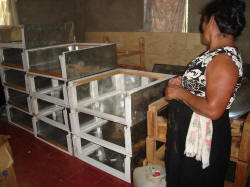 |
|
The solar box cooker is made from a durable combination of wood and sheet metal, and insulated with wood shavings (photo: Grupo Fenix) |
In late 2007, the Solar Women fulfilled their first significant order for
solar box cookers. They won a solar cooker competition hosted by the Mayor of
Esteli, which led to funding to build and deliver 22 solar cookers to select
families in Esteli. This was followed by workshops on how to use and care for
the solar cookers, and tips for assimilating the solar cookers into daily routines. Grupo Fenix and the Solar Women have received national and international
recognition for their dedication to sustainable development and for serving
as a model to other communities in Nicaragua and beyond. Most recently, the
Solar Women were one of five Supporting Entrepreneurs for Sustainable Development
(SEED) award winners. SEED is a global network founded by the International
Union for Conservation of Nature (IUCN), the U.N. Environment Programme (UNEP),
and UNDP. SEED awards support local start-up enterprises working in developing
countries to improve livelihoods, reduce poverty, and manage natural resources.
The specific project submitted by the Solar Women — Lighting up Hope and Communities
— includes the production and sale of solar cookers and solar food dryers, solar
roasted coffee, solar-baked cookies, and solar-produced jams, jellies, and pickles.
“This award recognizes [the Solar Women’s] innovation and entrepreneurship,
and their likely contribution to promote economic growth, social development,
and environmental management in Nicaragua,” noted SEED Executive Director Helen
Marquard. Contact: Susan Kinne, University Program - Programa Fuentes Alternas de Energía,
Universidad Nacional de Ingeniería – UNI, Managua, Nicaragua. Tel/fax: (505)
2278-3133, e-mail: info@grupofenix.org, Web:
www.grupofenix.org; Solar Center, Kilómetro
212, Carretera Ocotal, Totogalpa, Madriz, Nicaragua. Tel: (505) 8333-0197.
NORTH AMERICA AND EUROPE
United States
 |
|
Club RESC:UE members give solar cooking and solar water pasteurization presentations at local events and schools (photo: Club RESC:UE) |
A student-run community service club at Bella Vista High School in Fair Oaks,
California, actively promotes renewable energy through presentations, hands-on
workshops, and installations. Solar cooking and solar water pasteurization are
often highlighted by the students of Club RESC:UE (short for Renewable Energy
Sources Club: United Educators). At the annual “Get WET” Festival in Folsom, California, c
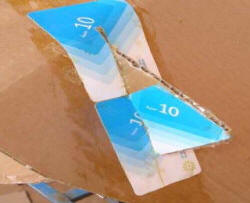 |
|
Stephen Harrigan suggests using plastic pre-paid phone cards to reinforce the “fingers, pockets, and necks” of cardboard panel-type solar cookers (photo: Solar Clutch) |
lub members converted
a fountain to run off solar energy and presented information about solar water
pasteurization using simple solar cookers. Club RESC:UE also co-sponsored the
annual “All Things Solar” event in Roseville, California. Club members acted
as solar cooking experts, demonstrating nearly two dozen solar cookers and serving
solar-cooked food to passersby. In addition, they participated in a solar cooker
construction workshop where participants built solar CooKits. Contact: Jesse DelBono, Club RESC:UE President. E-mail:
jessedelbono@comcast.net,
Web: www.clubrescue.org.
Anyone who has been to a country that uses plastic pre-paid phone cards knows
that the cards are found in abundance and typically discarded after use. Stephen
Harrigan of the U.S.-based consultation and training organization Solar Clutch
sent us this great tip: use the cards to reinforce weak areas of cardboard solar
cookers, particularly flaps and slots on panel-type cookers, the “fingers, pockets,
and necks” as Harrigan calls them. Rubber adhesive or contact cement can be
used to attach the cards. Contact: Stephen Harrigan. Tel: +1 (260) 418-6699, e-mail:
solarclutch@gmail.com,
Web: www.solarclutch.com.
SCI welcomes Dolores Weis
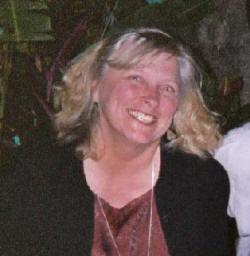 |
|
Dolores Weis |
Solar Cookers International (SCI) is proud to welcome Dolores Weis as its
new Executive Director. Dolores has a rare combination of proven leadership
skills, strong administrative capabilities, and international experience. She
brings 18 years of humanitarian management experience across many countries
and cultures, including Africa and Eastern Europe. A large portion of her efforts
have focused on health and women, issues closely intertwined with the work of
SCI. Dolores has been instrumental in dramatically growing several organizations,
including the Navajo Lutheran Mission, Air Serv International, and Women for
Women International, and will leverage this experience to capture and shepherd
the many opportunities that lay ahead for SCI. Dolores has a bachelor’s degree
in communications, a degree in practical nursing, and a master’s degree in public
administration.
Dolores assumed the reins on February 1st and hit the ground running. Weeks
before coming to Sacramento she was already helping to steer SCI’s projects
and future directions, including SCI’s decision to partner with Sun Ovens International
and Friends of Haiti Organization to provide solar cookers to families devastated
by the January 12th earthquake in Haiti. Thanks to additional donations from
SCI’s wonderful supporters, SCI has already contributed 200 solar cooking kits
and Water Pasteurization Indicators (WAPIs) to this relief effort. Funds for
additional shipments are currently being accepted.
Over the years, SCI has explored ways to increase its response capacity in
these types of situations. If the climate is appropriate, solar cookers can
be life-saving tools in the months following disasters that disrupt supply chains
and leave many families without cooking fuel. This is especially true of heavily
deforested countries like Haiti. Dolores is already working with SCI staff to
develop a scalable solar cooking and water pasteurization response package that
can be implemented by SCI or incorporated into other organizations’ relief efforts.
SCI’s Vital Advocacy Efforts
Influencing decision makers in governments and at the United Nations can
help with these efforts by opening minds to the usefulness of solar cookers
not only after catastrophes, but every day for hundreds of millions of people
around the world that live in sun-rich, fuel-poor areas. Much appreciation goes
out to SCI’s 13 volunteer U.N. representatives who — through SCI’s U.N. accreditation
— spend many hours sharing solar cooker successes with international policy
makers in Geneva, New York, Vienna, Bangkok, Beirut, Addis Ababa, and Santiago.
This opens doors for promoters at regional and country-level offices worldwide.
Most of the advocacy so far has been in the areas of sustainable development
(U.N. Commission for Sustainable Development), health (World Health Organization),
refugees (U.N. High Commissioner for Refugees), climate change (U.N. Framework
Convention on Climate Change), and clean air (U.S. Environmental Protection
Agency’s Partnership for Clean Indoor Air). SCI offers hearty thanks to these
volunteers for their dedicated service.
And special thanks go to you, SCI’s faithful donors, for continuing to provide
SCI with the resources and encouragement necessary to accomplish its mission
of promoting solar cooking and solar water pasteurization systems to benefit
people and environments. SCI estimates that only two percent of the half billion
people who need simple solar cookers have access to them. With your help, SCI
can continue to shrink the gap. You make all the difference.
Gary Hursh
SCI Board President
SCI Founder Anne Funkhouser Passes Away
One of Solar Cookers International’s founders, Anne Funkhouser, Ph.D., has
died. A retired biology professor, Anne was a long-time solar cook and a tireless
ambassador for solar cooking. SCI sends heartfelt sympathy to her family.
Tributes
Tribute gifts have been given to Solar Cookers International by:
- Anonymous in honor of Caitlin Fross
- Dr. Barbara Blum in honor of her mother, Bev Blum
- Karen Burt-Imira in honor of the Chandler family
- Robert Byrens and Jerrod Nickels in memory of their aunt, Harriet Love
- Helen and Robert Campbell in honor of their son, Carter Jay Campbell
- Ann M. Collentine and Kevin Williams in honor of John Collentine
- Phyllis Cribari in memory of Robert Morrow
- Michael and Judy Crowell in memory of Robert Newman
- Steven and Myra Douglass in honor of Jane Douglass
- Phyllis Elliott in memory of Phillip M. Elliott
- Karyn Ellis in honor of Carolyn J. Ellis
- Carol N. Gerlitz in memory of her husband, Bill Braddock
- Rachel and Richard Hansen in honor of John and Isa Cochrane
- Annette Howitt in honor of her grandson, Joshua
- Joseph Judge in honor of his wife, Patricia Judge
- Ann Prego in honor of her daughter, Tamara Gonzalez
- Sekip and Vivian Sahin in honor of Dr. Anne Thompson
- Robert and Shirley Sharps in honor of Holly Sharps and Lynn Holm
- Allien and Billie Whitsett in honor of Joy Whitsett
- Nanlouise Wolfe and Stephen Zunes in honor of Wendy Wolfe and family
Calling all U.S. federal employees!
 Are
you a federal employee? Do you know one? Solar Cookers International (SCI) has
again qualified as a participating organization in the Combined Federal Campaign
(CFC). SCI is a beneficiary of the effort through the Aid for Africa Federation.
We are proud to meet the rigorous financial, accountability, and governance
standards, and ask for your CFC support. Are
you a federal employee? Do you know one? Solar Cookers International (SCI) has
again qualified as a participating organization in the Combined Federal Campaign
(CFC). SCI is a beneficiary of the effort through the Aid for Africa Federation.
We are proud to meet the rigorous financial, accountability, and governance
standards, and ask for your CFC support.
Federal employees have the option of supporting SCI with either a one-time
gift or with recurring payroll deductions. For those interested in joining the
effort, our CFC number is 11023. This code directs your donation to SCI’s Africa
programs. Information is available on-line at
http://aidforafrica.org/members.php?id=43.
Your questions are also welcomed by SCI Resource Development Coordinator Rene
Hamlin. You can reach her by telephone: +1 (916) 455-4499, or e-mail:
rene@solarcookers.org
Thanks, federal employees, for your philanthropy and involvement in the effort
to spread this sustainable solar solution.
Solar Cooker Review
Solar Cooker Review (“Review”) is published two or three times per year with
the purpose of presenting solar cooking and solar water pasteurization information
from around the world. Topics include solar cooker technologies, dissemination
strategies, educational materials, and cultural and social adaptations. From
time to time we cover related topics such as women’s issues, wood shortages,
health, nutrition, air pollution, climatic changes, and the environment.
The Review is sent to those who contribute money or news about solar cooking
projects. The suggested subscription price is $10/year. Single copies are sent
free to select libraries and groups overseas.
We welcome reports and commentary related to solar cooking for possible inclusion.
These may be edited for clarity or space. Please cite sources whenever possible.
Send to Solar Cookers International (SCI), 1919 21st Street #101, Sacramento,
California 95811-6827, USA. You may also submit by fax: +1 (916) 455-4498 or
e-mail: kevin@solarcookers.org.
The Review is compiled and edited by Kevin Porter, SCI’s director of education
resources, with assistance from other staff. Layout is graciously donated by
IMPACT Publications located in Medford, Oregon, USA.
SCI is a 501(C)(3) nonprofit organization assisting communities in using
the power of the sun to cook food and pasteurize water for the benefit of people
and environments. SCI is a member of InterAction. We do not sell, rent or trade
names of donors. Tax ID # 68-0153141.
The Review is available on-line at
http://solarcooking.wikia.com/scr
|






















 Are
you a federal employee? Do you know one? Solar Cookers International (SCI) has
again qualified as a participating organization in the Combined Federal Campaign
(CFC). SCI is a beneficiary of the effort through the Aid for Africa Federation.
We are proud to meet the rigorous financial, accountability, and governance
standards, and ask for your CFC support.
Are
you a federal employee? Do you know one? Solar Cookers International (SCI) has
again qualified as a participating organization in the Combined Federal Campaign
(CFC). SCI is a beneficiary of the effort through the Aid for Africa Federation.
We are proud to meet the rigorous financial, accountability, and governance
standards, and ask for your CFC support. 